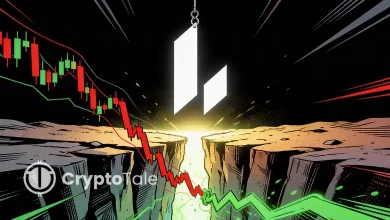Coinbase Lists ResearchCoin: Is DeSci the Next Frontier in Crypto Utility?

- RSC trading volume surges 305 percent, signaling strong demand for utility tokens.
- ResearchCoin powers DeSci platform, rewarding academic contributions via blockchain.
- Coinbase defends RSC listing transparency amid CEO conflict of interest concerns.
Coinbase has announced that ResearchCoin (RSC) will be listed on its Layer-2 Base network, built on Ethereum, starting July 31, 2025. The announcement, made late Wednesday, triggered a rapid 70% surge in RSC’s price, with daily trading volume crossing $1.2 million. Notably, RSC has jumped 99% since it was first added to Coinbase’s listing roadmap on July 25. This further marks a new focus on utility-driven cryptocurrencies based on real-world uses.
RSC Price Soars as Utility-Driven Crypto Gains Momentum
At press time, the coin is trading at 0.74 and has a market cap of $86.77M. Its 24-hour volume has increased by 305.43% to $5.37M. The increase highlights the demand in the market for tokens with practical relevance, at least within decentralized science research.
RSC drives the ResearchHub platform, whereby academic contributions are rewarded with blockchain-based rewards. Individuals receive RSC as a reward for publishing, reviewing papers, and engaging in peer-to-peer scientific cooperation. With this model, ResearchHub is set to be a menace to literature publishing, as most literature work is tied behind expensive paywalls.
The listing corresponds to the general strategy of Coinbase, where it tries to increase its crypto offerings by listing tokens with unique utility. Coinbase focuses on low-fee settings and scalable infrastructures by supporting RSC on Base. This will also enhance the presence of Base as a platform for new applications other than the DeFi and meme-based assets.
Transparent Review Amid Conflict Concerns
There were allegations that Coinbase CEO Brian Armstrong had an influence on ResearchHub, out of which RSC emerged. However, Brian stated that the listing decision was independently handled by its Digital Asset Support Group (DASG). The team is said to have been operating with strict measures to avoid executive interference with token approvals.
He also stated that he has no direct voting power in the listing process and disclosed his ResearchHub ties to Coinbase’s board. The CEO repeated his long-time promise of not selling his RSC shares within the next four years.
Despite his assurances, community debates persist about internal governance and transparency standards. Some users questioned whether DASG’s independence can withstand scrutiny in cases involving top leadership.
Related: JPMorgan and Coinbase Link Bank and Crypto Accounts—A Gateway to Mass Adoption?
DeSci Emerges as the Next Crypto Growth Arena
The listing of RSC is not only a market event but a possible shift of the crypto narrative to decentralized science (DeSci). In contrast to meme tokens, DeSci tokens facilitate the use of blockchain in real-world ecosystems, such as research and knowledge sharing. This has the potential to redefine crypto priorities: no more speculation, but serving a purpose through innovation.
ResearchHub was funded with $7 million from investors like Open Source Software Capital and Boost VC. Its orientation toward creating an open-access academic network challenges traditional institution-based research models. The RSC seeks to explicitly reward contributions in science, building a Web3 academic agora.
The backing of Coinbase could indicate that more major players are shifting to invest in DeSci as a potentially viable blockchain application. RSC’s long-term success depends on adoption and ongoing engagement from the scientific community; its Coinbase listing gives it credibility. The current price surge reflects short-term enthusiasm, though volatility may persist.




